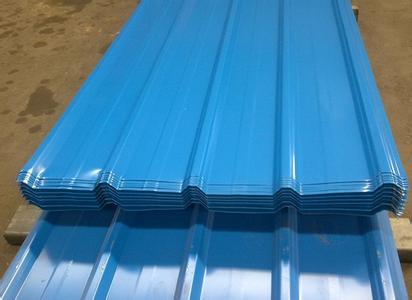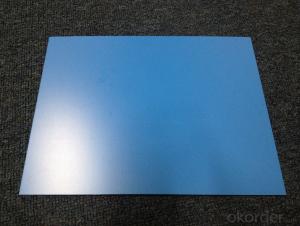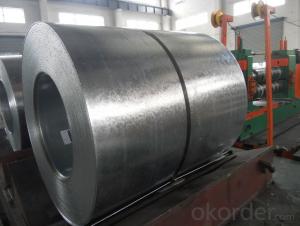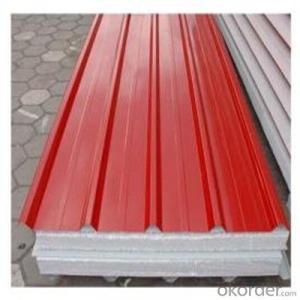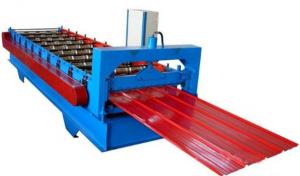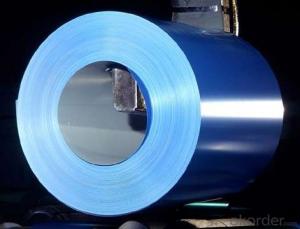Pre-Painted Galvanized Corrugated Steel---Royal Blue
- Loading Port:
- Shanghai
- Payment Terms:
- TT or LC
- Min Order Qty:
- 100 m.t.
- Supply Capability:
- 10000 m.t./month
OKorder Service Pledge
OKorder Financial Service
You Might Also Like
1. Pre-Painted GI/GL Steel Coil Description:
With GI as base material, after pretreatment (degrease and chemical treatment ) and liquid dope with several layers of color, then after firing and cooling, finally the plate steel is called pre-painted galvanized (aluzinc) steel. Pre-painted galvanized steel is good capable of decoration, molding, corrosion resistance. It generally displays superior workability, durability and weather resistance.
2.Main Features of the Pre-Painted GI/GL Steel Coil:
• Excellent process capability
• Smooth and flat surface
• Workability, durability
• Excellent heat resistance performance
• High strength
• Good formability
• Good visual effect
3.Pre-Painted GI/GL Steel Coil Images
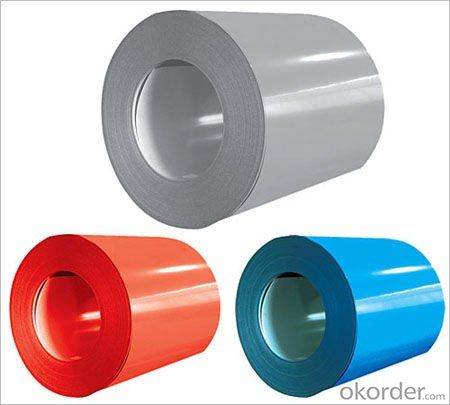
4.Pre-Painted GI/GL Steel Coil Specification
Standard: AISI, ASTM, BS, DIN, GB, JIS
Grade: DX51D, DX52D
Thickness: 0.17-2.0mm
Brand Name: KMRLON
Model Number: coil
Type: Steel Coil
Technique: Cold Rolled
Surface Treatment: Coated
Application: Boiler Plate
Special Use: High-strength Steel Plate
Width: 20-1250mm
Length: customized
commoidty: pre-painted galvanized steel coil
Thickness: 0.13-4.0mm
width: 20-1250mm
zinc coating: 40-180g/m2
printing thickness: top side: 20+/-5 microns, back side: 5-7 microns
color: all RAL color
surface treatment: color coated
coil weight: 4-7 tons
coil ID: 508/610mm
packaging: standard seaworthy packing
5.FAQ of Pre-Painted GI/GL Steel Coil
1. What’s the application of this product?
Roof, roof structure, surface sheet of balcony, frame of window, etc.
2. What’s the brand of the paint?
We use the best brand of all of the word—AKZO.
3. How to guarantee the quality of the products?
We have established the international advanced quality management system,every link from raw material to final product we have strict quality test;We resolutely put an end to unqualified products flowing into the market. At the same time, we will provide necessary follow-up service assurance.
4. How long can we receive the product after purchase?
Usually within thirty working days after receiving buyer’s advance payment or LC. We will arrange the factory manufacturing as soon as possible. The cargo readiness usually takes 15-25 days, but the shipment will depend on the vessel situation.
- Q: How do you calculate the yield strength of a steel sheet?
- The yield strength of a steel sheet can be calculated by dividing the maximum amount of stress that the sheet can withstand before it permanently deforms by the cross-sectional area of the sheet.
- Q: Can steel sheets be used for manufacturing electrical enclosures?
- Indeed, it is possible to utilize steel sheets in the production of electrical enclosures. The durability, strength, and capability of steel to provide essential safeguarding for electrical components have rendered it a widely employed material for constructing such enclosures. By employing steel sheets, one can ensure that the enclosure possesses robustness and can endure diverse environmental conditions. Furthermore, steel possesses commendable electromagnetic shielding properties, which aid in safeguarding delicate electronic equipment against interference. Additionally, steel sheets are resistant to fire, rendering them appropriate for manufacturing enclosures that must adhere to safety regulations. In summary, steel sheets are a dependable option for fabricating electrical enclosures due to their attributes and appropriateness for the intended purpose.
- Q: Are steel sheets suitable for medical equipment?
- Yes, steel sheets are suitable for medical equipment due to their durability, strength, and resistance to corrosion.
- Q: How do steel sheets handle bending or flexing?
- Steel sheets are known for their excellent strength and rigidity, making them highly resistant to bending or flexing. The inherent properties of steel, such as its high tensile strength and stiffness, allow it to withstand substantial external forces without deforming. Steel sheets can handle bending or flexing to a certain extent without compromising their structural integrity, making them suitable for a wide range of applications. When steel sheets are subjected to bending or flexing forces, they undergo a process known as elastic deformation. This means that the steel will temporarily change shape under the applied load, but it will return to its original form once the load is removed. This elasticity is due to the crystalline structure of steel, which allows it to absorb and distribute the stress evenly throughout its structure. However, it is important to note that steel sheets do have a limit to their bending or flexing capabilities. Beyond a certain point, the applied load can cause the steel to undergo plastic deformation, which results in permanent changes to its shape. This can lead to the formation of cracks or fractures in the material. The maximum amount of bending or flexing that steel sheets can tolerate before experiencing plastic deformation is determined by factors such as the thickness of the sheet, the grade and type of steel used, and the specific application requirements. To enhance the flexibility of steel sheets, certain processes such as cold rolling or annealing can be employed. Cold rolling involves passing the steel sheet through rollers at ambient temperature, which not only increases its strength but also improves its ability to withstand bending or flexing forces. Annealing, on the other hand, involves heating the steel to a specific temperature and then cooling it slowly to relieve internal stresses, making it more ductile and less prone to cracking. In conclusion, steel sheets are highly capable of handling bending or flexing due to their inherent strength, rigidity, and elasticity. However, it is essential to consider the specific application requirements and the limitations of the steel sheet to ensure its performance and longevity.
- Q: Are the steel sheets available in different grades?
- Yes, steel sheets are available in different grades. Steel is classified into various grades based on its composition, strength, and other properties. These grades include carbon steel, stainless steel, alloy steel, and tool steel, among others. Each grade has its own unique characteristics and is suitable for different applications. The choice of grade depends on factors such as the required strength, corrosion resistance, and cost-effectiveness for the specific application. Therefore, when purchasing steel sheets, it is important to consider the grade that best suits the intended use.
- Q: What is the average lifespan of a steel sheet roof?
- The average lifespan of a steel sheet roof can vary depending on various factors such as the quality of materials used, installation techniques, climate conditions, and maintenance. However, on average, a well-maintained steel sheet roof can last anywhere from 20 to 50 years.
- Q: Are steel sheets suitable for agricultural machinery?
- Yes, steel sheets are suitable for agricultural machinery due to their durability, strength, and ability to withstand harsh conditions commonly encountered in farming operations.
- Q: Can steel sheets be used for flooring?
- Yes, steel sheets can be used for flooring in certain applications. They are commonly used in industrial settings or areas with heavy foot traffic due to their durability and resistance to wear and tear. However, steel sheets may not be suitable for residential or commercial flooring where comfort and aesthetics are more important factors.
- Q: Are the steel sheets resistant to chemicals?
- Yes, steel sheets are generally resistant to chemicals. Steel is known for its strong and durable nature, which makes it highly resistant to corrosion caused by various chemicals. However, the level of resistance may vary depending on the specific type and grade of steel used, as well as the type and concentration of the chemicals involved. In certain cases, such as exposure to highly corrosive substances like acids or alkalis, additional protective measures like coatings or surface treatments may be necessary to enhance the chemical resistance of steel sheets.
- Q: Can steel sheets be used for conveyor belts?
- Yes, steel sheets can be used for conveyor belts. Steel sheets are often used as the base material for conveyor belts due to their strength, durability, and resistance to high temperatures. They provide excellent support for carrying heavy loads and are commonly found in industries such as mining, automotive, and manufacturing.
Send your message to us
Pre-Painted Galvanized Corrugated Steel---Royal Blue
- Loading Port:
- Shanghai
- Payment Terms:
- TT or LC
- Min Order Qty:
- 100 m.t.
- Supply Capability:
- 10000 m.t./month
OKorder Service Pledge
OKorder Financial Service
Similar products
Hot products
Hot Searches
Related keywords



